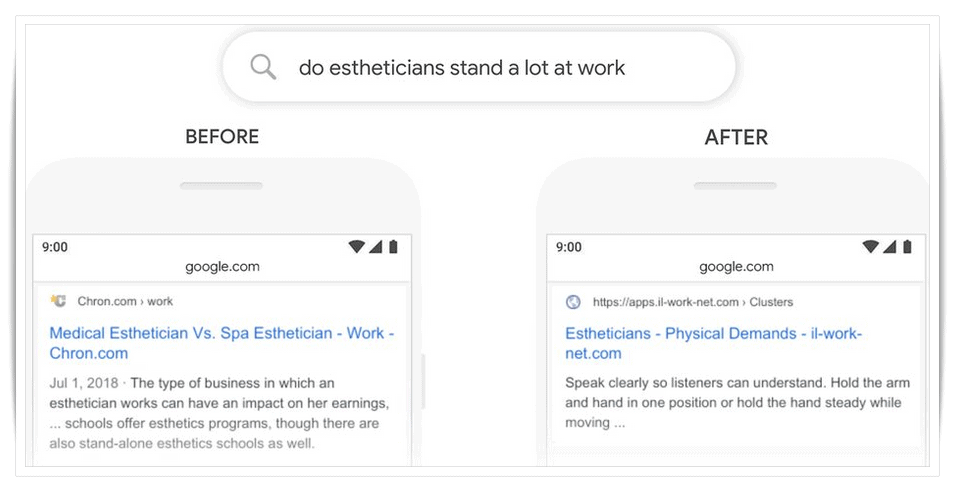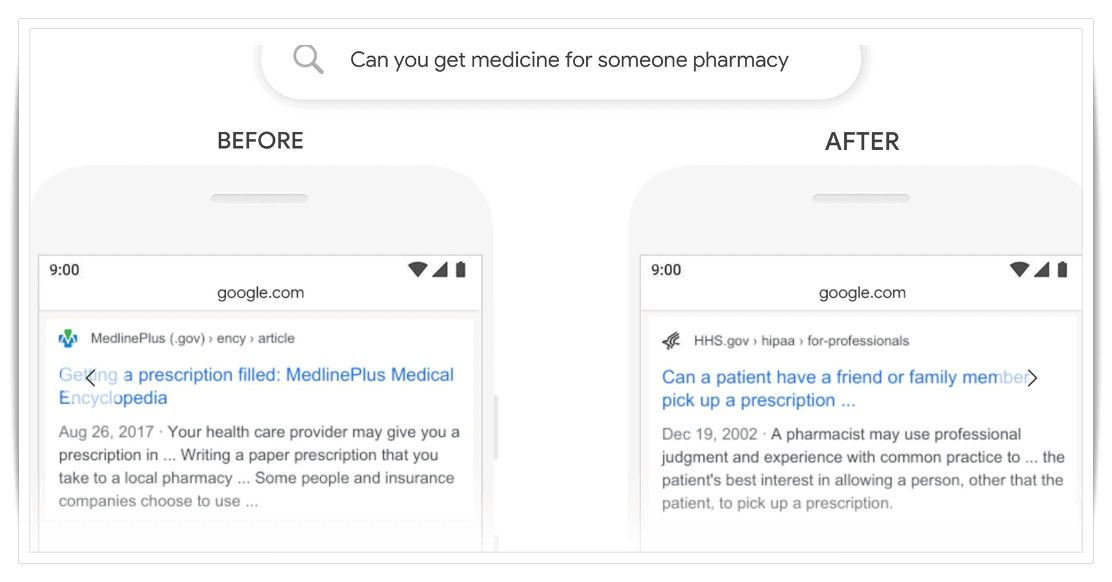
BERT is a Google ranking algorithm update that was released by the search engine giant somewhere in October 2019.
It is being touted as one of the most significant updates to be rolled out in the past 5 years.
What is the BERT update and how does it impact your process of content writing, and consequently, your rankings?
BERT is an abbreviation for Bidirectional Encoder Representations from Transformers. This is a neural network-based technique for natural language processing (NLP).
How does BERT interpret a search query?
The new language processing technique processes words in relation to all the other words in the search query being used, rather than analyzing them one-by-one, as it used to happen previously.
It tries to understand the full context of the query.
Basically, rather than simply interpreting the meaning of the search query, it tries to find out the intent of the search user. Why someone is trying to find what he or she is trying to find?
In this traditional form of search query interpretation, Google used to understand your queries in terms of the ordered sequence of words (left-to-right, right-to-left or combining both).
It mostly meant finding you all the pages not just carrying individual words used in the query, but different parts of the query and even the entire query.
BERT on the other hand helps the search engine algorithm understand the word context based on surrounding words.
This is a Google update that explains the concept of understanding the context rather than plain words:
Let’s look at another query: “do estheticians stand a lot at work.” Previously, our systems were taking an approach of matching keywords, matching the term “stand-alone” in the result with the word “stand” in the query. But that isn’t the right use of the word “stand” in context. Our BERT models, on the other hand, understand that “stand” is related to the concept of the physical demands of a job, and displays a more useful response.
Here is another great example to understand how BERT is going to affect search results.
Google can make out that the person asking the question, “Can you get medicine for someone pharmacy” wants to know if medicine can be delivered from the pharmacy.
As Google explains, “for someone” is an important part of the query and the query isn’t mainly about “medicine” and “pharmacy” as it used to happen previously.
Although keywords are still going to matter for a few years, what matters more is how you use those keywords to provide real value to your visitors. Give them the information they’re looking for rather than the information you think they should get.
To understand why Google keeps on rolling out these updates, you need to understand why Google exists as a search company.
Finding out information for people is not a hobby project at Google. It is a multi-billion-dollar enterprise.
Hence the company leaves no stone unturned to make sure that people find information they need instead of being fed with information webmasters and bloggers want to push.
Does the BERT algorithm update affect the way you write content for your website or blog?
There is no particular way of writing content specifically for the BERT algorithm update as such.
Whenever you write content and publish, just make sure that it provides value.
“Providing value” is not a lofty expression – it means publishing information people are looking for.
Don’t trick them into visiting your website.
When people come to your website and ask “what’s your point?” or “what are you trying to say exactly?” this is going to have a negative impact on your search engine rankings.
Conversely, when people come to your website and say, “Yes, this is exactly the information I was looking for and now I have found it,” your search engine rankings are going to improve.
Don’t worry too much about keywords and search phrases when writing content.
Though, use them contextually, wherever the easily fit.
Also, try to structure your ideas. This will help you when you’re trying to optimize for Google Snippets.
Read: Google’s Featured Snippets: How to rank at #1 with strategic content writing
If the Google ranking algorithm thinks that a particular chunk of content on your website conveys exactly what the search query is asking for, it will showcase it as a snippet.
In most of the cases, if you experience a decrease in traffic after the BERT algorithm update roll-out (assuming you have high-quality content already) you were getting the traffic unnecessarily and it was not adding any value to you as well as your visitors.
Nonetheless, if you want to improve your content quality you may focus on the following:
- Understand the searcher’s intent and then write on a topic.
- Provide answers to people’s questions.
- Don’t unnecessarily stuff keywords and search terms unless they are a part of your narrative.
- Don’t use complex sentences.
- Divide longer sentences into shorter ones.
- Organize various subtopics under headings and subheadings to make it easier for Google to understand your content.
- Write on topics that are important, yet, are not covered by many – be unique.
- Make sure you provide value – when people go back, they must take something with them.
- Write conversational content – a greater number of people are using voice search and when they use voice search, they form their queries as they speak.
- Make your content mobile friendly – it must be easier to read and grasp on a mobile phone.
Again, when thinking of how the BERT ranking algorithm affects your content writing, more than keeping the algorithm in mind when writing content, keep in your mind the need of your visitors.
Constantly think, what they are going to get out of what you’re writing. Provide them what they need, and you enjoy higher search engine rankings.
Other than this, you also need to learn to trust Google. It is not trying to create its algorithms in favor of certain websites.
If your content meets the needs of its users, it is going to find and rank it automatically. Else, you are not writing content for the right audience.
In fact, this is a blessing in disguise. When you holistically try to improve your search engine rankings, you get the sort of traffic your website deserves and when this happens, it is good for your business.


